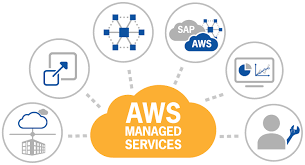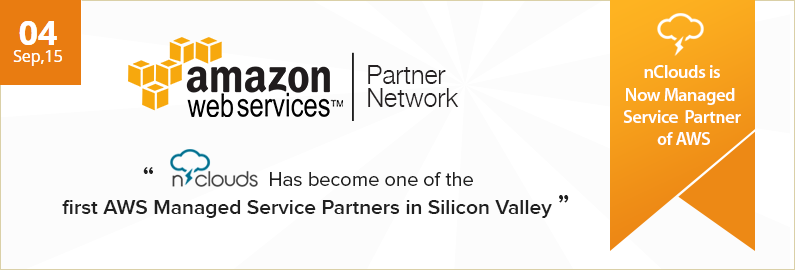AWS Managed Services: Infrastructure Operations Management
 AWS Managed Services gives your infrastructure ongoing management so that your business can focus more on your applications. When best practices are implemented to keep your infrastructure maintained, Amazon AWS Managed Services reduces risk along with your operational overhead. AQS automates backup services, security, patch management, monitoring, and change requests and offers complete lifecycle services to support, provision, and run your infrastructure. Our controls and rigor enforce your security and corporate infrastructure policies as well as enable you to develop applications and solutions by using a preferred development method. AWS Managed Services reduce cost, improve agility, and relieve businesses from infrastructure operations so you’re able to direct your resources towards differentiating your company.
AWS Managed Services gives your infrastructure ongoing management so that your business can focus more on your applications. When best practices are implemented to keep your infrastructure maintained, Amazon AWS Managed Services reduces risk along with your operational overhead. AQS automates backup services, security, patch management, monitoring, and change requests and offers complete lifecycle services to support, provision, and run your infrastructure. Our controls and rigor enforce your security and corporate infrastructure policies as well as enable you to develop applications and solutions by using a preferred development method. AWS Managed Services reduce cost, improve agility, and relieve businesses from infrastructure operations so you’re able to direct your resources towards differentiating your company.
What Does AWS Managed Services Offer?
AWS Managed Systems include predictable results and deliver consistent operations management by utilizing ITIL best practices while providing automation and tooling to reduce your risk and operational overhead as well as increase efficiency.
Managing Changes
AWS Managed Services provide you with an efficient, simple means of making controlled changes to your business’ infrastructure. For instance, if you need to change the configuration settings of your RDS database or deploy an EC2 stack, AWS will enable you to easily and quickly make this request through a dedicated self-service console. Some changes have a standard approval process. A majority of changes can be implemented through our automation engine right away. Others can be executed later on.
Managing Incidents
AWS Managed Services keep a close eye on your infrastructure’s overall health and also takes care of resolving and investigating incidents or alarms. If there is an EC2 instance failure, AWS will immediately recognize the failure, launch a new instance, and take corrective action to avoid or minimize interruptions in service.
Managing Provisions
Managed AWS services allow you to easily and quickly deploy your company’s cloud infrastructure while simplifying on-demand provisioning of pre-defined cloud stacks. AWS has an infrastructure that meets the needs of your application. AWS Managed Services automates and integrates with your current ITSM service catalog, allowing you to stand applications up in production or test environments using a self-service portal.
Managing Patches
AWS Managed Services keep your resources secure and current by taking care of your OS patching activities. Whenever patches or updates are released from OS vendors including Microsoft Windows Server 2012, RHEL 7m Linux, and Amazon, AWS will apply them in a consistent and timely manner to minimize your company’s overall impact. When needed, critical security patches are applied, while other patches are applied on your own schedule.
Managing Access
AWS Managed Services offer control and rigor through the application of AWS security best-practices. Default AWS security capabilities can be configured including EC2 security groups, and Identity and Access Management (IAM) to simplify access management while removing complicated authentication mechanisms. This will enable you to use your own company’s corporate credentials in order to access your AWS resources.
Managing Security
AWS not only protects your information, but it also keeps your infrastructure safe and secure. AWS has malware protection, intrusion prevention, and intrusion detection systems to manage security policies, and can recognize and respond to intrusions quickly.
Managing Continuity
Your AWS stacks can be backed up during defined scheduled intervals. At your request, or if an outage or failure negatively impacts your business, AWS will restore any of your backups, including RDS database snapshots and backed-up EBS volumes.
Reporting
AWS Managed Services provide you access to the same data we use to help manage your infrastructure including real-time data from AWS APIs, instance logs, CloudTrail logs, and Amazon S3 logs. Each month, your Cloud Service Delivery Manager will give you a summary of your infrastructure’s main performance metrics, including recommendations to optimize your platform’s usage, operational activities, and events with their corresponding impact.
Integration with ITSM
AWS Managed Services integrates with IT Service Management or ITSM tools like the ServiceNow platform which lets enterprise users get a unified look at their resources across a variety of infrastructure environments. Integration between ITSM tools and AWS Managed Services reduces development efforts while helping you avoid customized integration with AMS APIs.
Benefits
First-Rate Operations
AWS Managed Services help you manage your infrastructure’s daily operations in association with ITIL processes. Through automation, self-service tools, and monitoring, AWS keeps your infrastructure secure and safe, while quickly responding to and recognizing events to enable you to request changes easily centered around your needs. AWS Managed Services manages your company’s AWS operations so you won’t have to.
Governance and Security
AWS Managed Services provides standardized deployments, complies with your in-house policies, and integrates with Trend Micro Deep Security for endpoint protection. In addition, our infrastructure templates and operating environment stick to AWS’ architecture best practices to provide security, control, and governance that are important to your business.
Support and Advocacy
AWS alternatives like this are Managed Services give you access to our dedicated Cloud Service Delivery Manager along with Enterprise Support benefits at no extra cost to you. AWS Managed Services is responsible for operating your AWS infrastructure, but you have the control to run and build your applications and gain support and advocacy so you can focus more on innovation.


